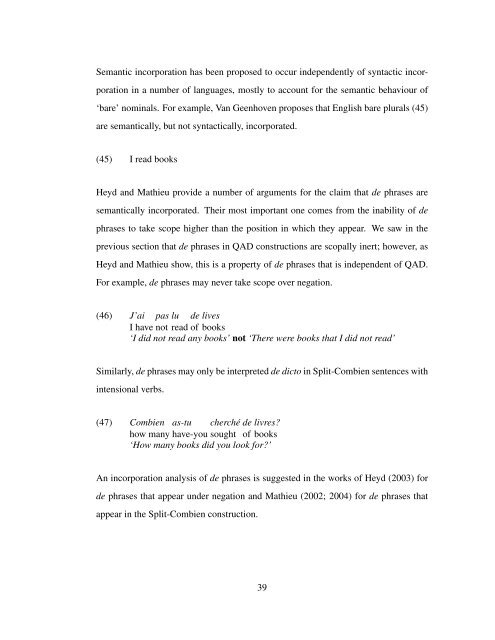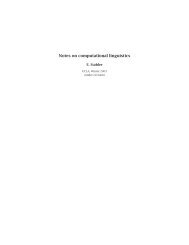Formal Approaches to Semantic Microvariation: Adverbial ...
Formal Approaches to Semantic Microvariation: Adverbial ...
Formal Approaches to Semantic Microvariation: Adverbial ...
Create successful ePaper yourself
Turn your PDF publications into a flip-book with our unique Google optimized e-Paper software.
<strong>Semantic</strong> incorporation has been proposed <strong>to</strong> occur independently of syntactic incorporation<br />
in a number of languages, mostly <strong>to</strong> account for the semantic behaviour of<br />
‘bare’ nominals. For example, Van Geenhoven proposes that English bare plurals (45)<br />
are semantically, but not syntactically, incorporated.<br />
(45) I read books<br />
Heyd and Mathieu provide a number of arguments for the claim that de phrases are<br />
semantically incorporated. Their most important one comes from the inability of de<br />
phrases <strong>to</strong> take scope higher than the position in which they appear. We saw in the<br />
previous section that de phrases in QAD constructions are scopally inert; however, as<br />
Heyd and Mathieu show, this is a property of de phrases that is independent of QAD.<br />
For example, de phrases may never take scope over negation.<br />
(46) J’ai pas lu de lives<br />
I have not read of books<br />
‘I did not read any books’ not ‘There were books that I did not read’<br />
Similarly, de phrases may only be interpreted de dic<strong>to</strong> in Split-Combien sentences with<br />
intensional verbs.<br />
(47) Combien as-tu cherché de livres?<br />
how many have-you sought of books<br />
‘How many books did you look for?’<br />
An incorporation analysis of de phrases is suggested in the works of Heyd (2003) for<br />
de phrases that appear under negation and Mathieu (2002; 2004) for de phrases that<br />
appear in the Split-Combien construction.<br />
39
















